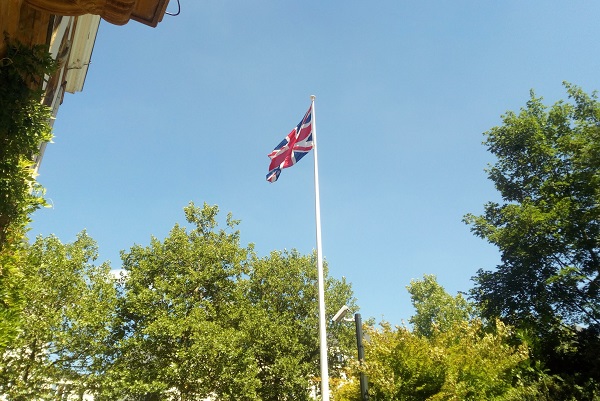 Union Jack outside the British Embassy in Luxembourg, 2017;
Credit: Jazmin Campbell
Union Jack outside the British Embassy in Luxembourg, 2017;
Credit: Jazmin Campbell
The United Kingdom general election is scheduled to take place on Thursday 4 July 2024; this will be the first election since Brexit, as well as the first time voter identification becomes a requirement.
General elections in the UK use a first-past-the-voting system where voters cast a single vote for a candidate; the candidate with the most votes wins. Although this system has been used in Great Britain since 1950 following The Representation People Act of 1948, the system often received criticism for its disproportional representation that is based on geography rather than the number of votes.
There are 650 Members of Parliament (MPs) in the UK Parliament. Currently, 345 of those positions are held by the Conservative Party, 206 by Labour, 43 by Scottish National Party, and 15 by Liberal Democrat Party. The rest of the spaces are occupied by ten other parties with less than 10 votes each.
The Conservative Party, having won previous elections in 2015, has been in power since 2010. Rishi Sunak has served as the leader of the party and Prime Minister since 2022, following the abrupt departure of Liz Truss in November of 2022. In the last election, the Conservative Party gained 48 seats while Labour lost 60. The two parties won 76% of the UK vote between them.
This July, the key issue for voters remains the country’s economic decline, reflected in a slow economic growth rate and rising inflation. This has also been affected by the UK's decision to leave the European Union (EU) in 2020, which severed trading agreements and export deals between the powers. However, none of the major parties have expressed any plans to re-join the EU after the elections. On the other hand, Liberal Democrats and the Green Party are in favour of reversing Brexit.
Aside from the economy and Brexit, the main issues voters wish to see addressed is migration, especially the illegal aspect of it. The Conservative Party considers this a priority, while Labour sees it secondary to the cost of living crisis issues. In 2022, then Prime Minister Boris Johnson vowed to send asylum seekers in the UK back to Rwanda, sparking outrage from many human rights groups and even the House of Lord. It is expected that a Conservative Party win with Sunak will lead to the first deportation of asylum seekers. Leader of the Labour Party, Keir Starmer, says the government will scrap the deal upon their victory.
The main political figures in this election are primarily party leaders. Rishi Sunak, representing the Conservative Party, promises to continue his international agenda with support for Ukraine and a peace plan for the Israel-Hamas war, as well as a focus on improving the economic state of the country through various policies such as reduction of waiting lists for the National Health Service (NHS) and lowered inflation rates. Keir Starmer from Labour promises to work on improving the relationship with the EU and recognising Palestine as a state.
Nigel Farage is making his eighth attempt at becoming an MP, and continues to be a key supporter of Brexit. As the leader of the Reform UK Party, he hopes to win some votes from previously conservative supporters. Lastly, Ed Davey from Liberal Democrats will be pushing to reinstate the party’s position as the third largest in the House of Commons. Following a centrist approach, the party’s main focus lies on improving the country’s social and health care, as well as advocating for the reintegration into the EU.
Latest polls have predicted a record change for Labour and a disastrous loss of support for the Conservative Party. It could possibly be their worst election result, and even an inability to secure over 100 seats in the parliament. However, change prevails in other parties as well. The Scottish National Party (SNP) may lose seats to Labour, meanwhile Liberal Democrats may benefit from the loss of Conservative seats as well. The Green Party is aiming to maintain 4 seats in the parliament and continue to garner support for future elections.
All in all, this upcoming election has important repercussions not only for the United Kingdom, but also the global political and economic state as a whole. Thursday 4 July is an important date for British citizens and others alike.








